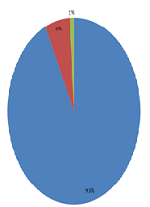Knowledge, Treatment and Prevention of Malaria by Students of Enugu State University College of Medicine
Keywords:
Knowledge, malaria, prevention, treatment, universityAbstract
Background: Malaria is a life threatening disease caused by parasites that are transmitted to people through the bites of an infected female anopheles mosquito and is a major public health problem especially in Sub-Saharan Africa where 90% of the world’s malaria occurs. The aim of this study was to ascertain the knowledge, treatment and prevention of malaria by students of Enugu State University College of Medicine (ESUCOM). Materials and Methods: This is a cross sectional descriptive study that involves students of Enugu State University College of Medicine (ESUCOM) who answered questions through a questionnaire on malaria. The students in ESUCOM included medical students, anatomy students and medical laboratory science students. Stratified sampling method was used to divide the students into groups and simple random sampling method was used to distribute the questionnaires. Results: Majority of the respondents were medical students (63%) with a slight greater percentage of females (54%) compared to males (46%) and the peak age range was 21-25yrs (56%). Responders opined that children aged, 1 – 5 years, were mostly susceptible to malaria. Majority of the respondents (69%) see high fever as the most common symptom of malaria. Most (77%) believe that people get infected by bite from infected mosquito while the least percentage believes infection is from bad air (1%). Majority of the respondents (74.5%) believe that mosquitoes breed in foul/polluted water while 22.3% believe they breed in clean or unpolluted open collections of water. A significant number (64.9%) believe that preventive anti malaria drugs should be taken by everybody followed by pregnant women (25.8%). Only 4.1% are not aware of those that should take preventive anti malaria drugs and the use of an insecticide treated net (63.3%) is the major way of preventing mosquito bites. Conclusion: Our study revealed that majority of the students of ESUT College of Medicine (ESUCOM) was aware of the mode of transmission and the various manifestations of the malaria. It also showed that there is still a high level of self-medication among the students and therefore a poor health seeking behavior.
Downloads

Downloads
Published
Issue
Section
License

This work is licensed under a Creative Commons Attribution 4.0 International License.
Creative Commons License All articles published in Medicine & Community Health Archives are licensed under a Creative Commons Attribution 4.0 International License.




